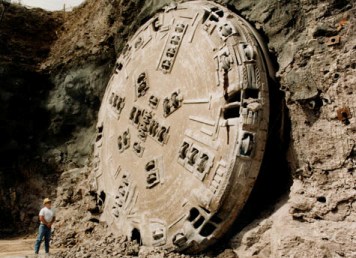The problem of where to put nuclear waste goes back to the drawing board

In its final report, a federal blue-ribbon commission suggests that it may be time to throw in the towel on Yucca Mountain, the embattled project to store high-level nuclear waste in Nevada. Billions have already been spent on the project, which appears to have reached a dead end.
But the urgency to find a safe, permanent home for nuclear waste in the U.S. was tragically underscored last March by the destruction of three Japanese reactors and their storage pools of spent fuel rods, after an ocean tsunami overwhelmed the Fukushima plant’s coastal defenses.
According to the Commission:
“The need for a new strategy is urgent, not just to address these damages and costs but because this generation has a fundamental, ethical obligation to avoid burdening future generations with the entire task of finding a safe, permanent solution for managing hazardous nuclear materials they had no part in creating…”
The report is the culmination of two years’ work by the commission, and says its recommendations offer, “the best chance of success going forward, based on previous nuclear waste management experience in the U.S. and abroad.”
[module align=”left” width=”half” type=”aside”]Key recommendations for Nuclear Waste:
– A consent-based approach to siting future nuclear waste storage and disposal facilities, noting that trying to force such facilities on unwilling states, tribes and communities has not worked.
– Responsibility for the nation’s nuclear waste management program be transferred to a new organization; independent of the Dept. of Energy
– Assurance that fees being paid into the Nuclear Waste Fund – about $750 million a year – are being set aside and available for use as Congress initially intended[/module]
Toward that end, the commission is urging an immediate search for a new underground storage site, as well as transitional sites to provide an alternative to storing highly radioactive used fuel rods at the nation’s nuclear power plants. As Ingrid Becker and I reported last year, the technology already exists for permanent storage of the 65,000 tons of spent nuclear fuel currently parked at about 75 operating and shutdown reactor sites around the country (more than 3,000 tons in California). Meanwhile, working power plants nationwide are generating another 2,000 tons of waste every year.
The government has another 2,500 tons of nuclear waste, mostly from past weapons programs, at a handful of government-owned sites, including an underground site near Carlsbad, New Mexico, the world’s only fully operational geologic repository for radioactive waste.
Christopher Joyce reports for NPR News on the commission’s final report and the growing consensus that active local involvement is critical in siting decisions.
2 thoughts on “Requiem for Yucca Mountain: Federal Commission Says to Move On”
Comments are closed.


Huh? The report did not say that Yucca was dead. It specifically stated that it did not judge Yucca Mountain either way. But it did say that local support is needed – which Yucca Mountain had in the six surrounding counties which are larger in area than 25 of the states. How much more local support do you want? Oh, sure, Senator Reid is against it for political reasons, but the locally affected people wanted the repository.
You’re right, Dave. The commission was not asked to rehash Yucca’s suitability as a site, and it didn’t. But I think most observers took the commission’s recommendations as a signal to move on, especially the call for an immediate search for alternate sites. In retrospect, I probably did overstate that in the original version of the post. Thanks.